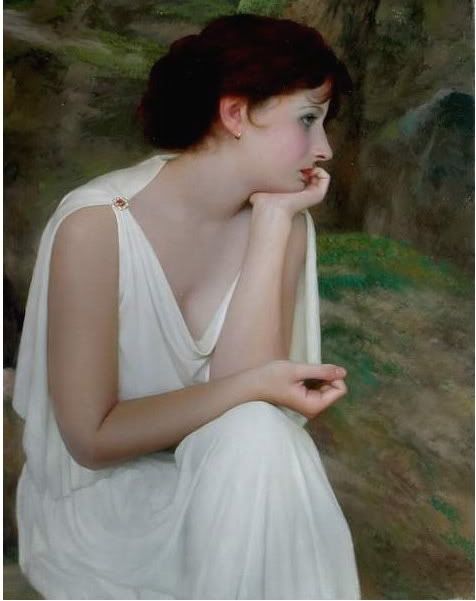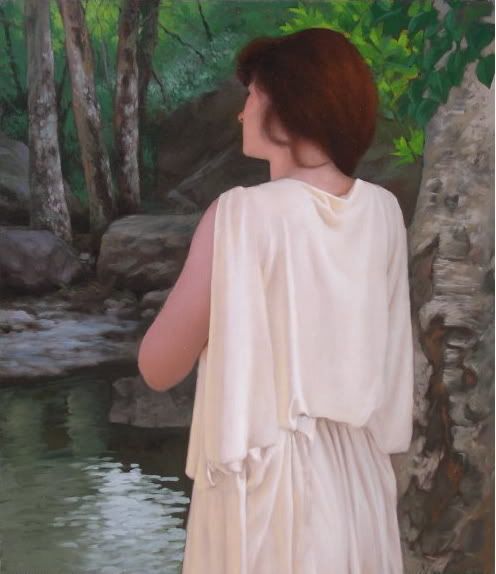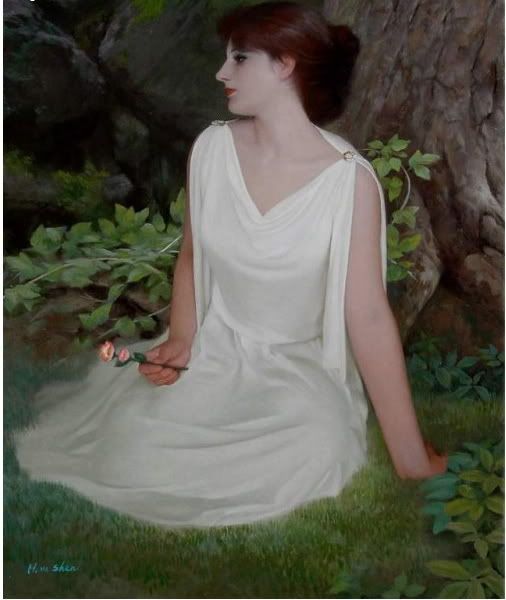One can also see, in the comments to the post on Han-Wu Shen, Vassilip, who has also worked in paint, making somewhat existentialist objections against realist painting and especially against the quote from Lukacs which serves as the epigraph for the post: I wonder, do you really believe that a realism in art (any realism) is possible? I mean, do you really believe that is possible to translate true experience (if ever we be fully able to be her masters) into icons? ...Can you not see how outrageously utopian is Lukacs’ statement (even in his upside-down Hegelian …Platonism)?"
As appears in my reply already to Vassilip, I categorically reject the idea that somehow Reason is unable to contain experience as philosophically absurd. This does not mean that rationality is whole or complete as yet, but it does mean that the breaks and gaps, the contradictions that are present within the Real, are experiences of Reason coming into contradiction with itself, not of Reason coming into contradiction with some Other which is uncontainable. This position serves as a good benchmark to judge the limits of my sympathies with typical expressions of (post-)Marxism, which is often quite extensive. But it seems to me that figures like Sartre and Adorno betray the dialectic when they contrast Reason with Matter. This makes matter into the Real which Reason can never fully comprehend (this is expressed in both as a kind of "priority of the object"). But certainly, to echo Hegel, if Reason can experience itself in contradiction with Matter, then it has somehow already seen beyond the supposed limit of Reason in order to experience itself as grinding against its own Other: it has transcended the supposed limit. As such the contradiction is transformed into a conflict between two moments of Reason itself. This leads to a position I have articulated on a number of occasions: namely that the Whole conditions everything we do and that we all act for the Whole in some form or another (see most recently 'Freedom', but also 'Dialectic' and, negotiating the relationship between Hegel and Adorno, 'The Struggle, Part 6').
Now, these philosophical issues do not by any means address the larger issues being raised here against realism, and I think the issues are very serious. I would agree that if all that is left to 'realism' is the demonstration of technique then it is ideologically dead, and has nothing more to contribute. And that is certainly the danger right now: a camera and foto-shop is a much more appropriate mode of production than oil and canvas. But if, somehow, realism can incorporate the lessons learned from 'modern art' then maybe it can have some future. I suggested that possibly Han-Wu Shen had tried to incorporate some of these lessons through his comparison of his work to industrial painting within the genre of decorative figure painting (it is admittedly very difficult to foresee a revival of historical figure painting). This would allow the genre within which he is working to transcend itself. To put it another way, it would allow abstract art to recover a certain amount of explicit narrative content without giving up its central truth: form and color.
That said, I have to admit that is not clear that Han-Wu Shen's project is truly sustainable, judging by his own work. He recently left China for the west coast of the United States and since that time has generated a number of 'decorative' paintings in the worst sense, which only seems to the feed the blindness of the art-consumer. I include three examples below:
Han-Wu Shen, "Reverie" (2004)
Han-Wu Shen, "Reflection (Reverie #2)" (2004)
Han-Wu Shen, "Daydream (Reverie #3)" (2004)
Here one quickly notices that the lack of content is present as much in the subject as in the over-all object itself. The reader is rendered as intellectually inert and mindless as are these (notably caucasian) women caught up in their various reveries. Finally, one can see immediate parallels with Dante Rossetti's own "Daydream" etc. I believe a similar critique can be leveled at Han-Wu Shen in these paintings as was leveled at Rossetti in an earlier post (see 'Daydreams of Conformity').
-LoA
Thursday, June 7, 2007
the possibilities of realism, part 2: han-wu shen's daydreams of conformity
Some time ago, Alaleh Alamir, who is herself a painter, asked, in response to the post on Han-Wu Shen (see 'The Possibilities of Realism: a Case for the Art of Han-Wu Shen'), "Could hyper-realism in painting still make sense in the age of fotoshop and its like? realism can represent a technical challenge do the doer; I am not sure it brings anything more to the viewer or to world consciousness..."
Subscribe to:
Post Comments (Atom)
6 comments:
He recently left China for the west coast of the United States and since that time has generated a number of 'decorative' paintings in the worst sense, which only seems to the feed the blindness of the art-consumer. I include three examples below:
Those seem very life like to me, especially the first one, although I accept your professional critique.
my criticism is not meant to call into question his talent as a painter, or his technique in these 3 paintings, any more than i am questioning rossetti (whose paintings i love, no matter how many criticisms i might level against him). but i think alaleh's question really hits home: it is not clear how these paintings justify themselves (how the content justifies the form when the form itself is under such pressure), what they bring to the reader as paintings.
[i agree, btw, that the 1st is the polished in terms of technique.]
best wishes,
LoA.
LoA, thanks for the rec on eteraz.
I'm certainly not a scholar on art but what struck me on these pieces is that although the models are caucasian, they seem to be the 'Asian' view of what beauty is - pale, luminous skins, dark hair that isn't entirely black - really intriguing from a cultural perspective. This is the type of woman my mother's generation would thinks of as 'true' beauty.
dear Lawrence,
thanks for your kindness to reply to my comment-aporia.
it is truely a marvelous thing that this means gives to us the chance to meet;
but, at the same time, it is difficult one discusses properly when one has to do with so subtle matters without the inspiration which the face of one's interlocutor can give.
the result is, almost always, a lot of misunderstandings; so it is better sometimes, though you want to say many, to leave the response for another time, more fruitful (?).
i will try to find a moment to send to you some material, which i hope will make clear my doubtful-ctitical stance, and, also, will give to you some delight.
for now, let me add only a short remark:
the critique of realism's illussion, is not at all denial of Reason; but, on the contrary, it is a denial of rationalism, which is denial of Reason; that is, i believe, critique of illusionism is, as a denial of denial of Reason, an agon to bring back Reason-logos from its bontage in the violence of reductionistic Ratio.
best wishes
/vassili
Those are some fantastic paintings.
Wow, we have some philosophers in here. I'd like to throw in my two cents. I'm a classically trained realist artist. These paintings are actually amateur in every way. They show little sensitivity to beauty or nature, let alone composition. They look like they were simply copied from photographs with a silly background thrown in. Take a look at a real painting, like an Ingres or a Leighton and tell me you can do that with a camera and photoshop. Representational art has little to do with mechanical reproduction. Even if it did, I promise that a really good trained artist could make something more truthful than what a camera could produce. You have to realize that we are sort of trained to believe that a photograph is what the world looks like. Its only a mechanical interpretation. However, all good realists deviate from what they see anyways. Leighton took obvious liberties and yet we call him "realistic." It's tiresome for people like me to listen to these kinds of debates. The masters knew more about abstractions than the abstract artists do. Try looking at a Sargent from an abstract point of view. There is some sophisticated stuff happening there!! It's ignorance or poor taste to say otherwise! Try reading the Twilight of Painting. It has a lot of good things to say on this topic. Also check out artrenewal.org Sorry to be so gruff, but the anonymity just makes it irresistible.
Post a Comment